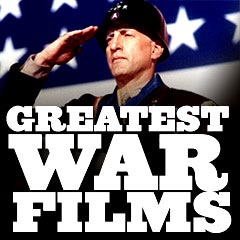
|
Greatest War Movies 2010s |
| Film Title/Year/Director, War-time Setting and Brief Description | ||
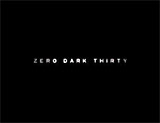
|
Zero Dark Thirty (2012)
Scriptwriter and former war journalist Mark Boal's account was partly fictionalized in the film with Best Actress-nominated Jessica Chastain portraying CIA intelligence-gathering analyst Maya playing a key role. The war film was a gripping historical account of the events leading up to the successful night-vision raid on bin Laden's headquarters with stealth helicopters and a group of SEALs. The confirmation of the mission's success included snapshots of the dead body and the message: "For God and country, Geronimo." Controversy arose over the political timing of the film's release, improper acquisition of classified information by the filmmakers, the depiction of Maya's fight against the "system," some factual inaccuracies, and the propagandistic position that the film took toward torture ('advanced interrogation techniques'). |
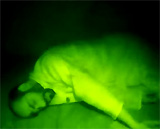 
|
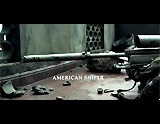
|
American Sniper (2014)
A biographical (although somewhat controversial) true story of US Navy SEAL Chris Kyle (portrayed by Bradley Cooper), who became known as the deadliest marksman in US military history. It became the highest-grossing war film of all time, and was based upon Kyle's own memoirs detailed in his best selling book in 2012 - American Sniper: The Autobiography of the Most Lethal Sniper in U.S. Military History. The Texas-bred sharpshooter Kyle enlisted in the Navy after learning of the horrific series of US Embassy terrorist bombings that occurred in 1998. After the 9/11 attack, he was sent on his first tour to Iraq. Eventually, he was credited with over 250 combat kills (many of which were officially confirmed by the Pentagon). However, his many legendary missions overseas and his witnessing of war atrocities were overshadowed by the adjustment struggles he faced when on leave as a civilian, and at home with his wife Taya (Sienna Miller) and young children. |
  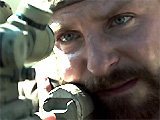
|

|
Fury (2014)
The title of this episodic, realistic and tense war film was taken from the name painted on the barrel of the US Marine tank’s big gun. US tank forces and brigades during the final days of WWII in Europe were battered, as evidenced by a Sheman ("Easy Eight") tank warfare crew commanded by weary, battle-hardened Sgt. Don "Wardaddy" Collier (Brad Pitt). They were on a deadly mission, now fighting their way across Nazi Germany in the waning year of the war, and facing very bloody conditions (graphically portrayed) as the Nazis fought more viciously in their retreat to Berlin. Wardaddy's four-man veteran crew, composed of Bible-quoting gunner Boyd "Bible" Swan (Shia LaBeouf), Southerner loader-mechanic Grady "Coon-Ass" Travis (Jon Bernthal), and Hispanic lead driver Trini "Gordo" Garcia (Michael Pena) had become hardened to war and murder. They often were heard saying: "Best job I ever had." The arrival of innocent rookie recruit and sensitive novice Pvt. Norman Ellison (Logan Lerman), a cultured desk typist, changed everything in their perspective until he also became corrupted by war's horrors. In one confrontational scene, "Wardaddy" forced the incompetent, endangering Ellison to execute an SS officer, and in another, encouraged him to lose his virginity with young German Emma (Alicia von Rittberg), although she became a victim of the war shortly later. By the end of the film, Norman had earned his own nickname, "Machine" - and he was the only survivor of a last stand of the tank crew against a huge battallion of SS soldiers. |
 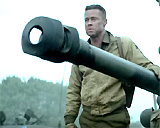 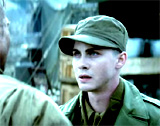 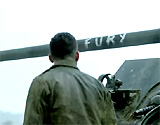 |

|
Unbroken (2014)
This inspiring war film about a resilient WWII war hero, based on a true story, was adapted from the 2010 book Unbroken: A World War II Story of Survival, Resilience, and Redemption by Laura Hillenbrand. The war biopic told the incredible life story of Italian-American Louis "Louie" Zamperini (Jack O'Connell), a 1936 Berlin Olympics medal-winning runner in the 5,000 meter race, who was recruited into the US Air Force during WWII. In 1943, during a search mission for a lost US aircraft over the Pacific, his own damaged B-24 bomber plane The Green Hornet crashed into the ocean off the coast of the Japanese-held island of Nauru. With only one other survivor Russell Allen 'Phil' Phillips (Domnhall Gleeson) after many days, the two struggled on a small inflatable life raft with enemy planes, threatening sharks, extreme weather conditions, and lack of food and water. After 47 days, they were captured by the Japanese and imprisoned. Louis endured further hardships, beatings and torture for two years as a POW in a Tokyo camp known as Omori, administered by sadistic and deranged Japanese commanding officer Mutsuhiro "The Bird" Watanabe (Miyavi). Zamperini survived until being liberated at the end of the war in 1945, by remembering childhood principles: "If you can take it, you can make it," and "A moment of pain is worth a lifetime of glory." |
 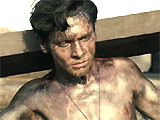  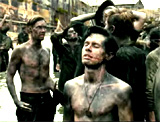
|

|
Hacksaw Ridge (2016)
This was an inspiring, true-to-life, anti-war WWII epic and character study about conscientious objector/corporal Desmond Doss (Andrew Garfield). He refused to carry a gun due to his Seventh Day Adventist beliefs, although he still enlisted after Pearl Harbor to serve - and was fighting as an unarmed medic. During one extremely fierce and horrific battle to take the Maeda Escarpment cliff face (nicknamed "Hacksaw Ridge") from Japanese forces, Doss exhibited unprecedented courage and bravery (proving his naysayers wrong). He saved dozens of wounded fellow soldiers by lowering them, in the face of live enemy fire - one-by-one - down the escarpment by rope (while praying to his Lord: "Help me get one more"). Subsequently, he was awarded the Medal of Honor by President Truman for saving seventy-five men on the battlefield - it marked the first time that the award was given to a conscientious objector. |
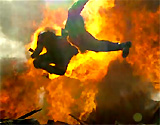 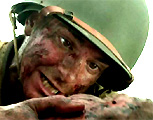 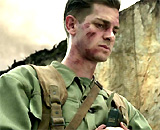
|
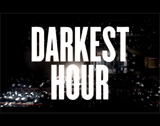
|
Darkest Hour (2017, UK)
This British historical war drama and biopic was set in May 1940, and followed the rise of Winston Churchill (Gary Oldman) during his early days as Prime Minister during WWII. It also detailed the War Cabinet Crisis, while Nazi Germany's Wehrmacht swept across Western Europe and threatened to defeat the United Kingdom. In scenes of political dialogue, debate and confrontation, the iconoclastic Churchill courageously stood steadfast against Hitler's forces, as in the sequence of his "Blood, toil, tears, and sweat" speech. He resisted the superior Axis forces to the end, and was opposed to others who recommended negotiation and appeasement policies, such as Neville Chamberlain (Ronald Pickup), toward the Nazis (his famous "We Shall Fight" speech - "We shall fight on the beaches"), even though the UK was vastly outnumbered and faced certain defeat and surrender. |
|

|
Dunkirk (2017, UK)
Director Christopher Nolan's vividly-presented war drama (told in a tricky, time-bending fashion) chronicled one of the turning points of the war in 1940 when 300,000 Allied soldiers were surrounded and trapped on Dunkirk beach in France, and sought evacuation by land, sea, and air. The gripping, violent, and intense tale followed British soldiers who sought to find a way to cross the Channel back over to England, including one brave British private named Tommy (Fionn Whitehead). Civilian volunteers with their own boats ferried some soldiers across, while others hid inside an abandoned beached trawler while awaiting the tide to rise to carry them over. In one particular instance, civilian sailor Mr. Dawson (Mark Rylance) with his son Peter (Tom Glynn-Carney) on his boat Moonstone, rescued a shell-shocked downed fighter pilot from a wrecked ship. British spitfire aircraft valiantly attempted to defend the crossing. One fighter pilot named Farrier (Tom Hardy) flew across the Channel to Dunkirk, but then his fuel ran out just as an enemy plane attacked. He landed on the beach and was forced to set fire to his plane before being taken prisoner by the Germans. Also on the beach, Royal Navy Commander Bolton (Kenneth Branagh) was waiting on the dock to help in the evacuation of the French. |
|
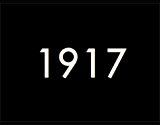
|
1917 (2019, UK)
This tense war story presented a visually-immersive, beautifully-choreographed sequence (as one long tracking shot) set at the height of the Great War (WWI). During grimy and dirty years of trench warfare, two young low-ranking British soldiers, Lance Cpl. William Schofield (George MacKay) and Lance Cpl. Tom Blake (Dean-Charles Chapman) were given urgent orders by General Erinmore (Colin Firth), to enter and cross German-occupied enemy territory (known as No Man's Land). They would have to undertake within 24 hours - about a 9 mile journey on foot - to warn Colonel Mackenzie (Benedict Cumberbatch) in a nearby 2nd Battalion of the Devonshire Regiment that the Germans had set a trap and the British Expeditionary Force should not attack. If the message didn't arrive on time, it might mean the ambush massacre and death of 1,600 British soldiers, including Blake's brother - Lt. Joseph Blake (Richard Madden). Their traverse of the desolate and corpse-strewn landscape was horrendous and gripping with views of rotting bodies and dead horses. Amidst the horrors, map expert Blake lost his life (in his companion's arms) after being lethally stabbed in the abdomen by a downed German dogfight pilot. Schofield promised his partner that he would fulfill the mission, write to Blake's mother, and tell them that Blake didn't die scared. Cpl. Schofield suffered a hand injury from barbed wire, the blast of a trip-wire in a German underground barracks set off by a rat that covered him with rocks, another close brush with death when a bullet struck his helmet and he was knocked unconscious (the screen went black), plus hellish nighttime gunfire lit by flares in the town of Ecoust-Saint-Mein and a near drowning. The message was delivered a few moments too late (and Schofield had to sprint over the active battlefield in a parallel direction as the first wave of infantry troops were attacking). Col. Mackenzie reluctantly followed orders, although he sighed that his orders would probably change again in the next week. In the film's postscript, it described the inspiration for the film - co-writer/director Mendez' paternal grandfather Alfred had told similar stories about his service during World War I. |
|
(chronological by film title) Introduction | 1900s-1920s | 1930s | 1940s-1 | 1940s-2 | 1950s | 1960s-1 | 1960s-2 | 1970s | 1980s | 1990s | 2000s | 2010s | 2020s |